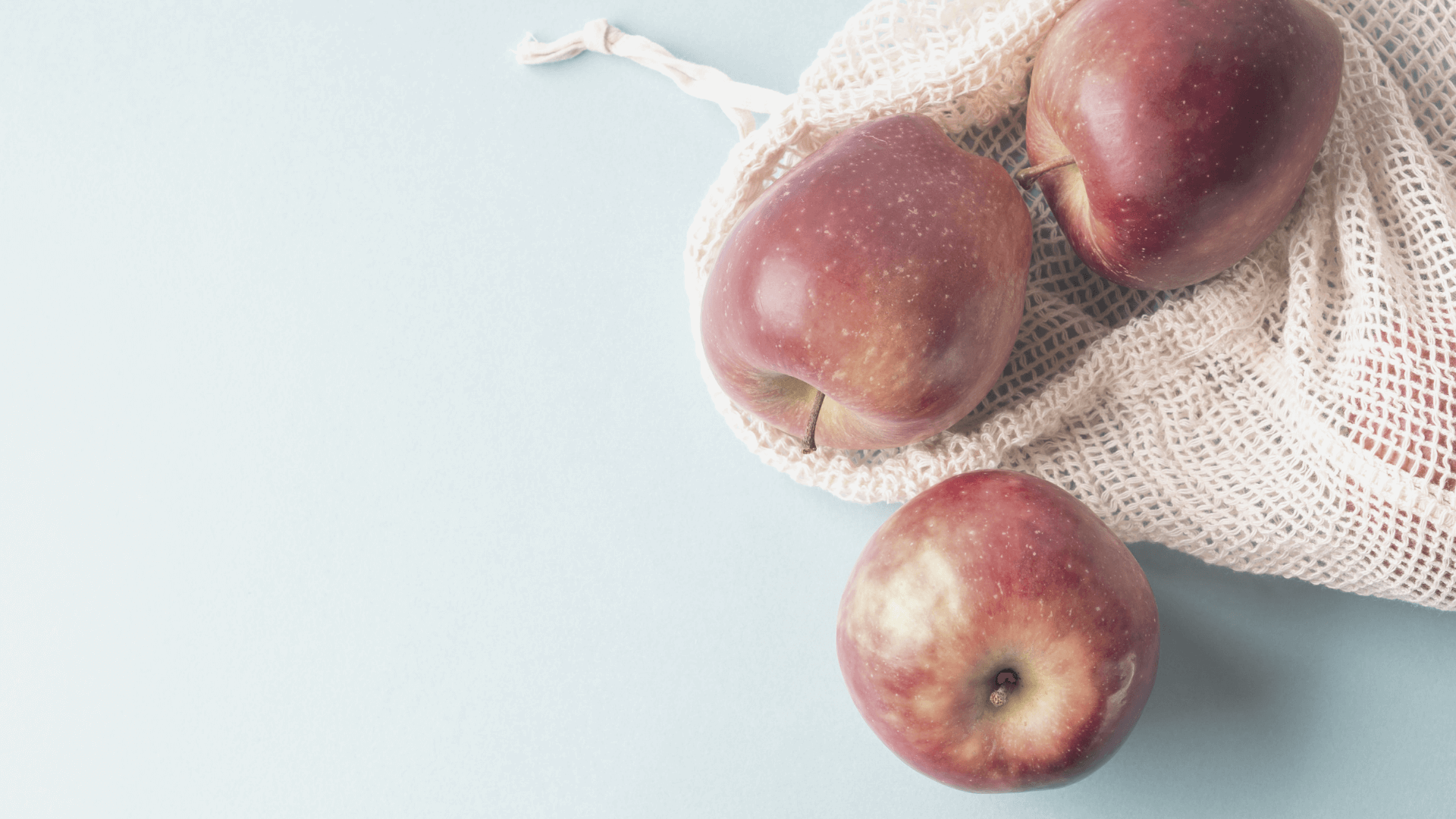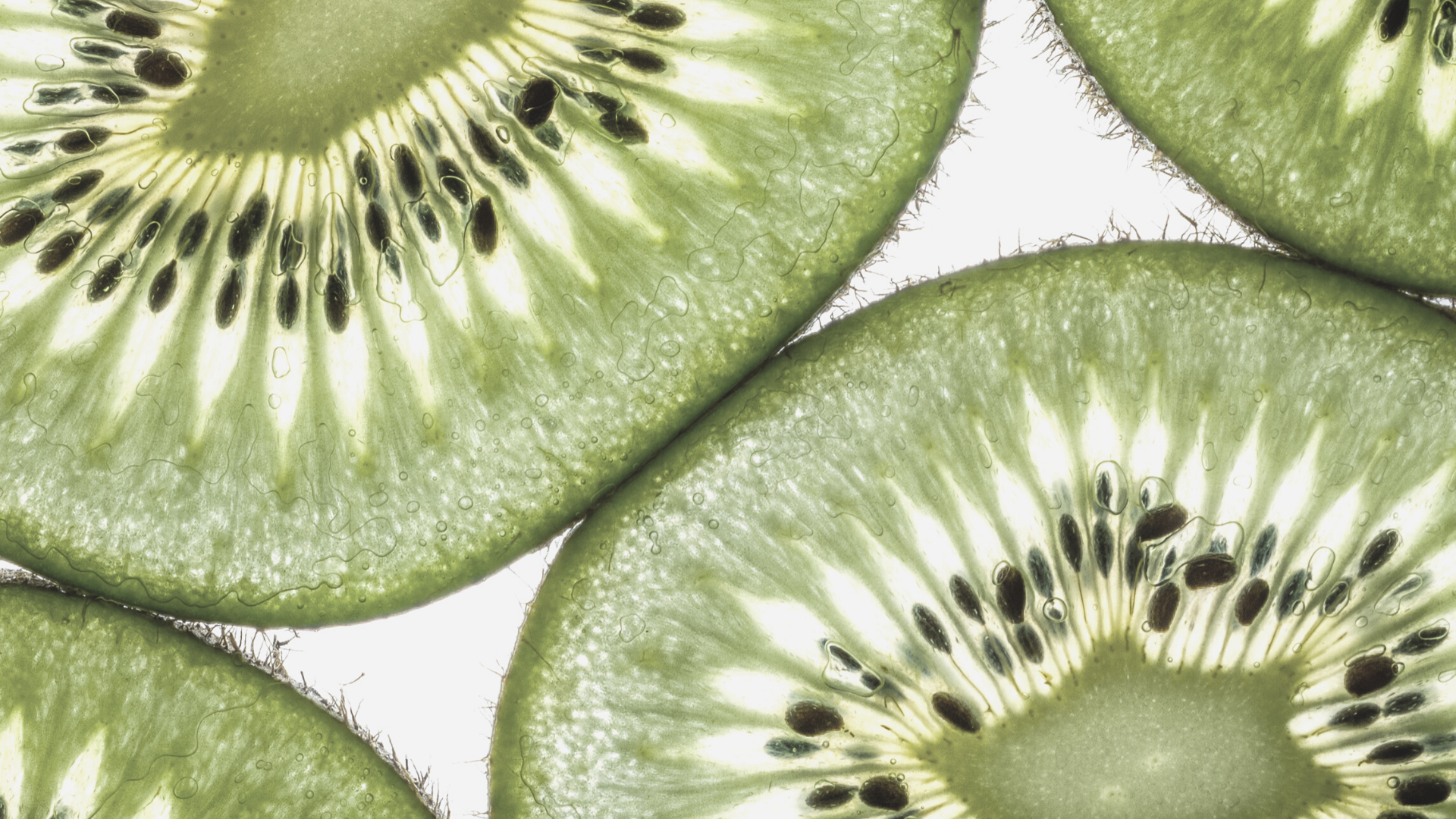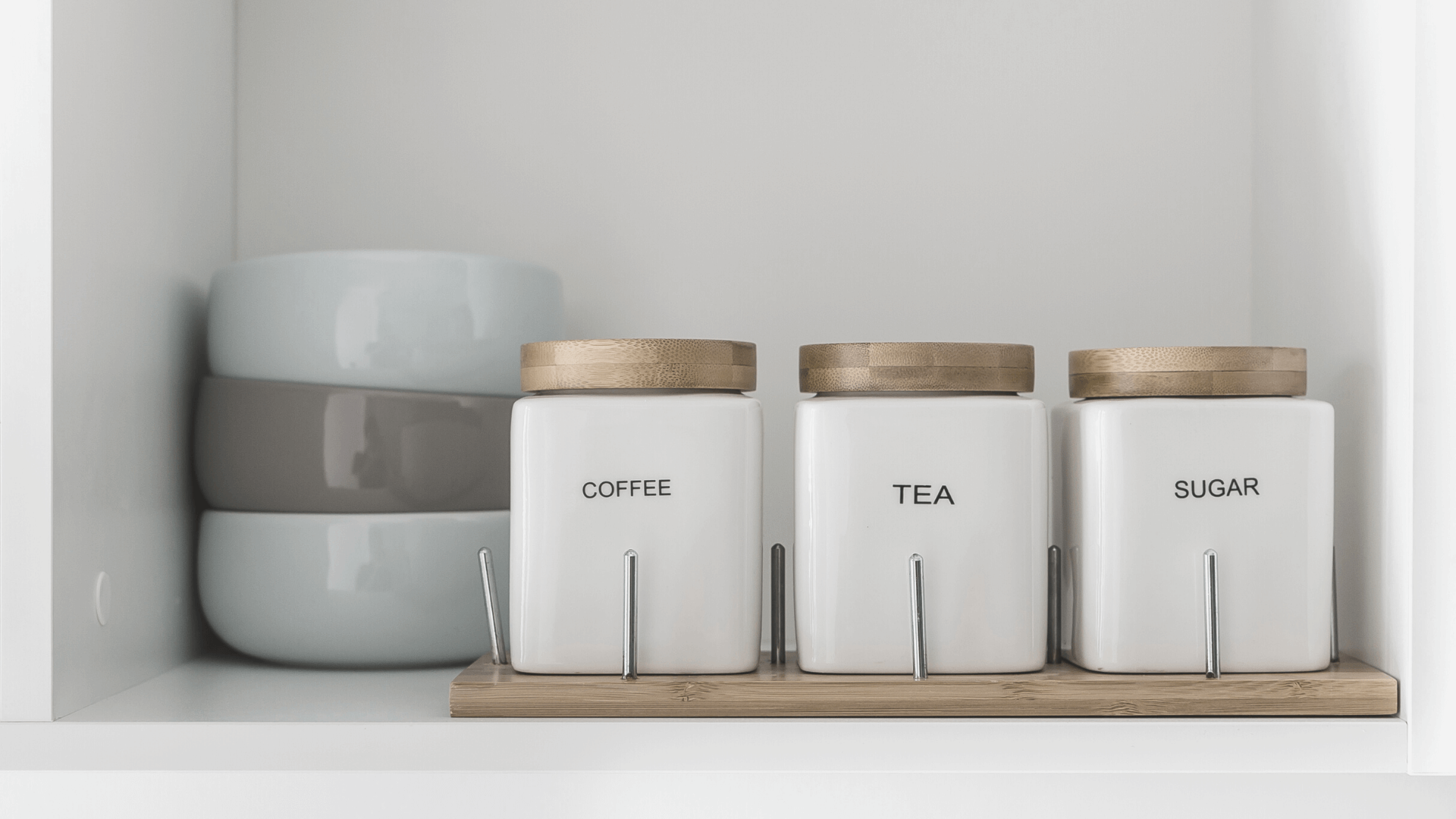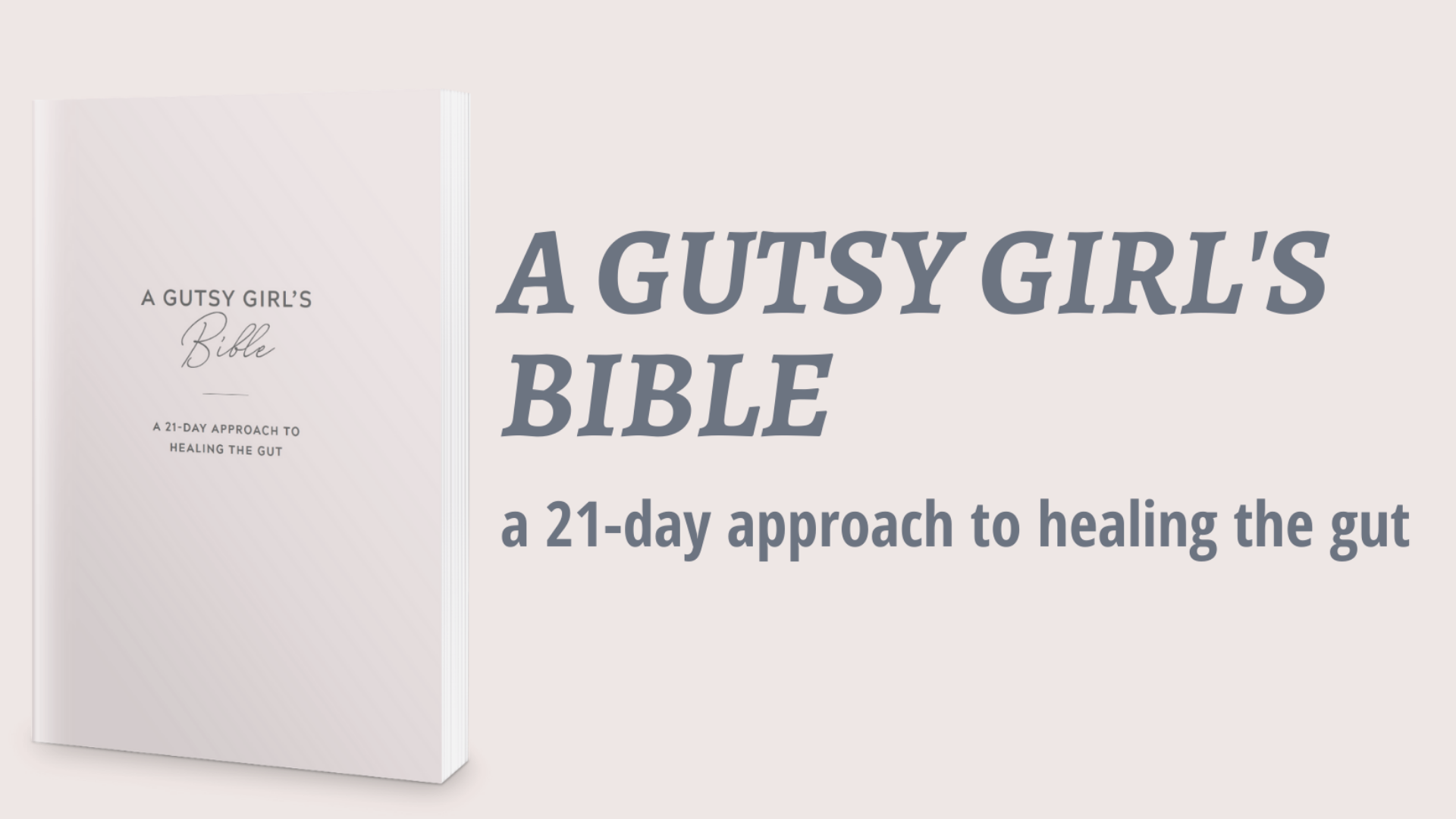V. important conversation around no more fight or flight digestion, just for you.
Can I be really honest with you about something?
There are many nights when I don’t eat much dinner. And if I do eat dinner, it’s a smaller amount, before the rest of my family eats.
And this has everything to do with the topic at hand – getting away from the fight or flight digestion mode.
Sit tight, I’ll get to more on this in a bit.
Fight or Flight vs Rest and Digest
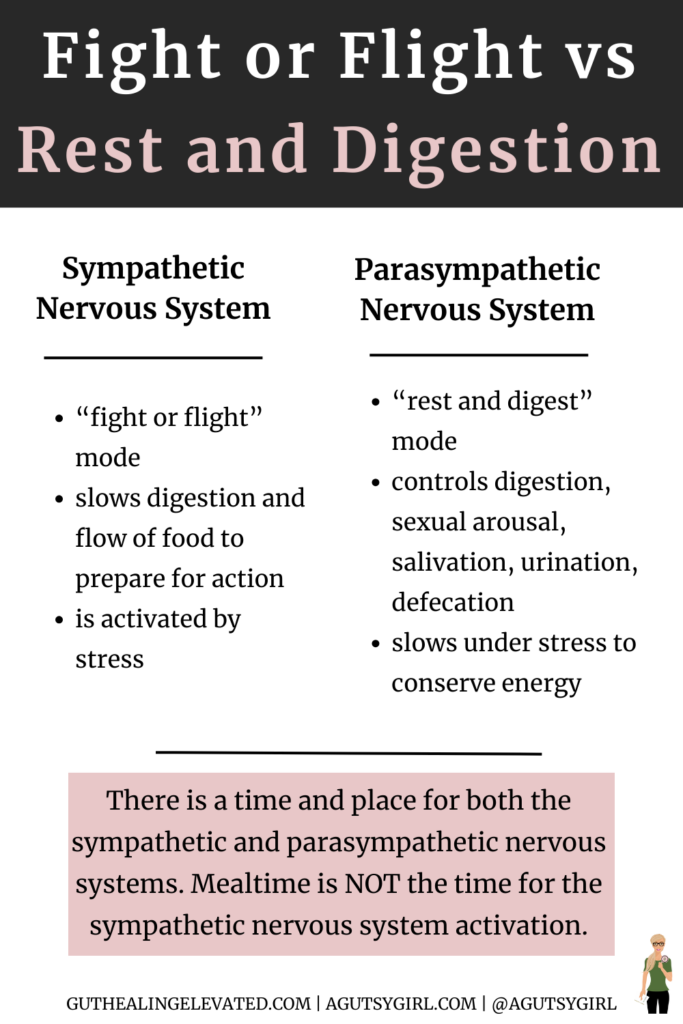
First, let’s talk a little more about fight or flight.
There are two types of responses the body produces: fight or flight or rest and digest.
And these two responses fall under two different nerve centers: the sympathetic nervous system or parasympathetic nervous system.
Sympathetic Nervous System
- fight or flight
- slows digestion and flow of food to prepare for action
- activated by stress
Parasympathetic Nervous System
- rest and digest
- controls digestion, sexual arousal, salivation, urination, and deification
- slows under stress to conserve energy
There is a time and place for both the sympathetic and parasympathetic nervous systems.
However, mealtime is not the time for the sympathetic nervous system activation.
No More Fight or Flight Digestion
Click HERE to save no more fight or flight digestion for later.
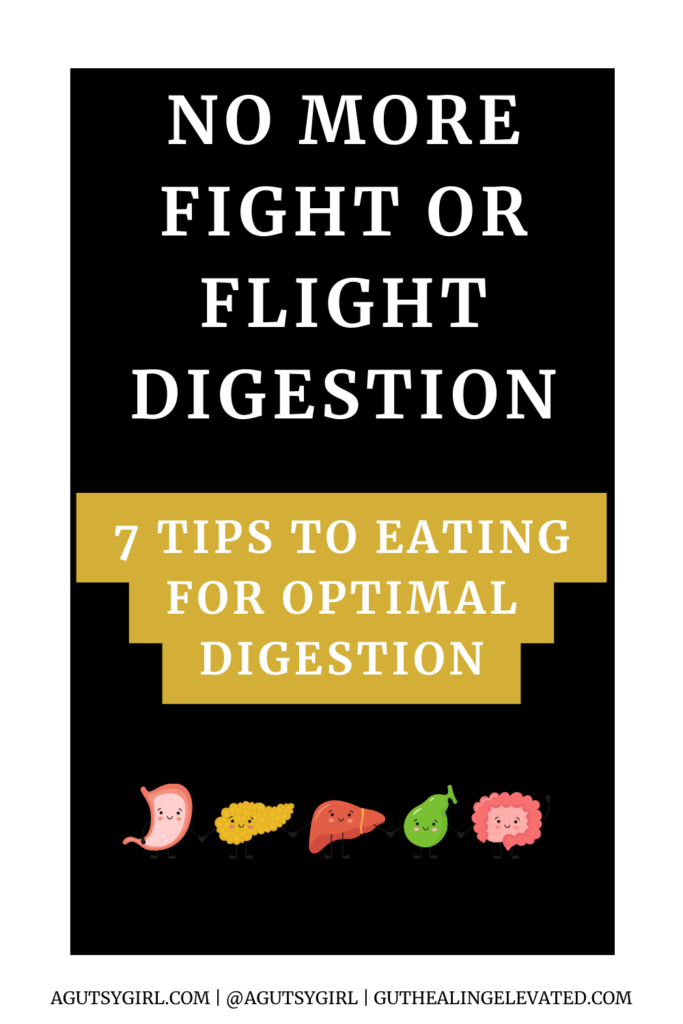
When the sympathetic nervous system is activated during mealtime, then it competes with digestion.
Instead of properly taking in and digesting food, your body is giving signals saying,
Digestion can wait; we’ve got other important tasks to handle.
And these other important tasks could be anything. They are the things your body is perceiving as important.
In other words, they consist of your stress factors.
Remember that so much of what happens in the brain affects what happens in the gut. Stress does cause digestive distress. And furthermore, what constitutes stress runs far and wide. For a refresher on all of this, check out Is Stress Causing My Digestive Distress?
What Actually Happens During Fight or Flight Digestion?
So when the sympathetic nervous system is activated during mealtime, here are things also occurring:
- Heart rate and blood pressure increases
- Pupils dilate
- You’re on edge
- You might tremble or shake
So, the very best thing we can do is to get out of that fight or flight digestion mode whenever mealtimes occur.
One foot cannot be on the gas and the other on the break simultaneously.
I always knew this because I studied it in school. But too often I think the correlation between what we study and what actually is falls short.
So I asked myself a simple question and then started testing the question on myself,
Is how we eat as important as what we eat?
Here is what I discovered.
Is How We Eat is as Important as What We Eat?
Around the time I endured my final massive bout of gut healing, I began practicing with both intermittent fasting and meal spacing. It was around this same time when I began to let go of the more restrictive diets.
In fact, once my gut felt healed and I felt well (plus my Colonoscopy and Endoscopy proved it with clear readings), I began to change both how I ate and what I was eating.
I became “free” with what I was eating. If you remember, this was kicked off when I went to Italy that summer just after the Colonoscopy and Endoscopy results. Italy brought all the eats, treats, and goodies. There was no category of food excluded during the trip. I ate anything and everything.
But it was around that time when I also started experimenting with intermittent fasting and meal spacing.
And quite literally, every single day since then (yes 2+ years ago already), I have continued on the path towards eating anything and everything. But I have also experimented with every last thing possible regarding how, when, and why I eat the foods I choose to eat.
Honestly, I could never have known just how impactful the how was until I spent time recording in my journal. Shameless plug and reason #4,567 why you need this journal, too.
So the first thing to know is that, yes, absolutely, how you eat is as important as what you eat.
Now, here are 7 tips to eating for optimal digestion.
7 tips to Eating for Optimal Digestion
Click HERE to save these tips for later.
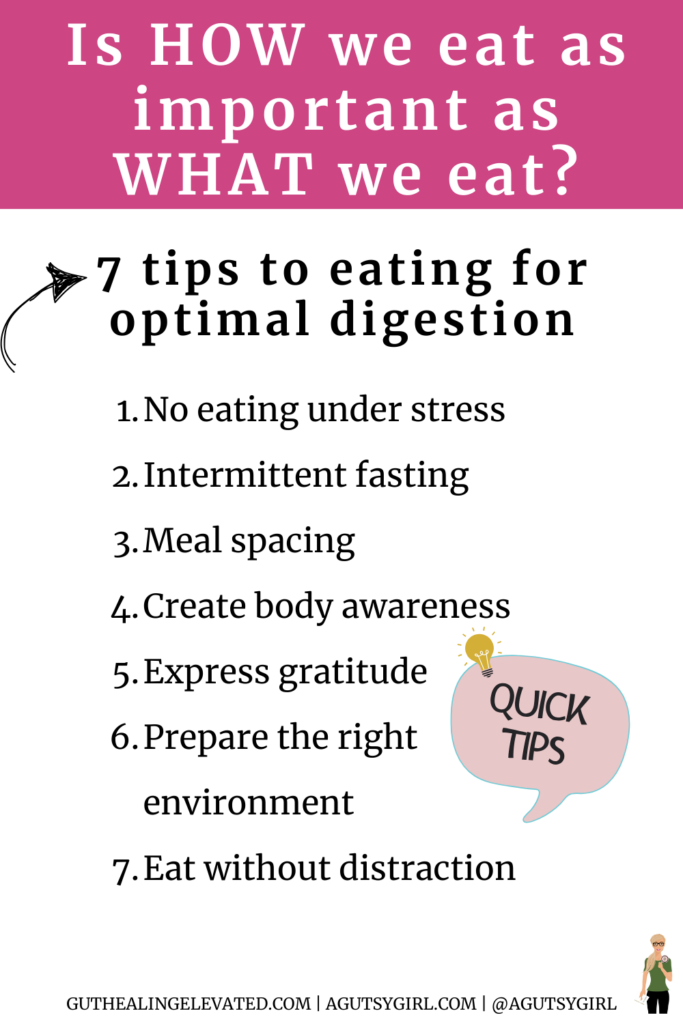
1. No eating under stress
Remember what I said at the beginning of this post?
“There are many nights when I don’t eat much dinner. And if I do eat dinner, it’s a smaller amount, before the rest of my family eats.”
Unless you intimately know our family, you can’t understand dinner dynamics.
There is almost 0% chance that one could eat dinner in a complete rest and digest mode. And I used to fight that.
But I started realizing that with more climbing on tables, escalated voices, and just an all-around chaotic environment that was present, there was no way I was properly digesting my food.
And yet still, eating dinner as a family is very important to us.
So we work at it almost every single night.
But instead of trying to do it all, I just planned around it. If I eat a ton of breakfast and lunch (which I usually plan on now), then dinner is super small before everyone else eats.
And this works for me like a charm.
2. Intermittent Fasting
While it’s not for everyone, it has been key for my overall health and healing long-term.
I don’t practice it “like normal.”
I stay in a smaller fasted window; 12-14 hours only typically.
But again, this works like a charm for me. You can read more about it HERE.
3. Meal Spacing
By spacing out meals at least 90-120 minutes, the MMC (migrating motor complex) has the opportunity to do its job.
And its job is to “sweep” through and clear through the intestines.
I tend to meal space more like 2-4 hours for a full digestive rest.
You can’t expect the digestive system to constantly be at work and not under stress.
Are you ever not under stress if you constantly have to work?
4. Create body awareness
Prior to eating, come back into your body, listening to the cues while eating.
What are the food textures like? Which flavors are you able to extract?
Additionally, pay attention to your breathing. In fact, right before I eat, I always take a huge, deep breath and exhale.
At the height of my SIBO, I was rarely breathing and my anxiety was at an all-time high.
Focus on the present moment, keeping an inward focus on how your body is feeling and the way it’s actually responding to the food and environment.
Want a good book to read that addresses all things breath? I’m currently digging Breath: The New Science of a Lost Art by James Nestor.
For years, I told myself that xyz food was bloating me.
Looking back, I wish I could have seen the importance of body awareness while eating.
Was it really that food? Or was it my mind telling me the bloat was coming from the food? Both are valid, but you must distinguish between the two.
5. Express gratitude
For the Gutsy community, food has become plain old complicated.
On the one hand, there is this deep desire to just “be normal, eating whatever.”
But on the other hand, food has become a great source of fear. “If I eat this food, then xyz will happen.”
Prior to eating, try expressing gratitude first before having either of those thoughts.
If you’re the praying kind as I am, pray. Give thanks to God for the food that is sitting in front of you to consume.
Reflect on abundance because not everyone has this gift.
Keep positive thoughts around the food and your gratitude for it and the people it took to get said food placed on your table.
Does this sound woo-woo to you? But if you’ve never tried it, how will you ever know if it’s real or woo-woo?
6. Prepare the right environment
I actually love eating at our dinner table when the conditions are right. All that’s on the table is a table runner and my DIY Table Jars filled with things that compliment meals.
This is another key to eating under conditions for optimal digestion.
Clear your table of clutter, and create a pleasant table top.
Maybe you can put on soothing music, or have a candle lit for comfort. Just kidding, do not use the candle. Remember, swap out that candle and swap in the diffuser.
When it’s warm out, I love eating outside on the porch. If you have an option for doing this, try it.
The right environment can make a huge difference.
7. Eat without distraction
And the final thing you can do to help mealtime digestion is to enjoy the food without distractions.
It’s not necessary to have your phone with you 24/7.
Make your meal space a work and tech-free zone. Disconnect with anything and everything distracting.
Did you know that the brain can only focus for 50-90 minutes before needing a break so it’s actually more productive to simply eat and only eat during mealtimes.
What We Eat is Still Important
Please don’t misunderstand this whole post as me saying, “Eat whatever you want, as often as you want, as long as you’re adhering to the above.”
This could not be further from the truth.
The reason is because stress comes in many forms.
One way is through “junk” food; literal junk. I’m not saying junk is off limits forever, no matter what. But I am saying that processed foods are stressful on the digestive system.
And we can’t live assuming that a diet of processed foods while taking deep breaths in an essential-oil diffused room is optimal.
It’s not.
So yes, it’s true. I do not follow any specific diet anymore.
I also don’t restrict any complete food groups (i.e. gluten or dairy).
However, I also don’t live on processed foods 24/7.
I lean in and listen to what my body needs and wants, and then I consume those needs and wants within the parameters which keep my digestive system in rest and digest mode. This way, enzymes are fully produced and digestion occurs as it should.
So what do you think? Have you ever considered that how you eat is just as important as what you eat?
If you liked this post, you might also enjoy:
🤰 bloating be gone! weight loss through optimal gut health for women
💃ʜᴇᴀʟ ʏᴏᴜʀ ɢᴜᴛ. ʜᴇᴀʟ ʏᴏᴜʀ ʟɪfe.
🫶🏻 founder gutbyome.com




